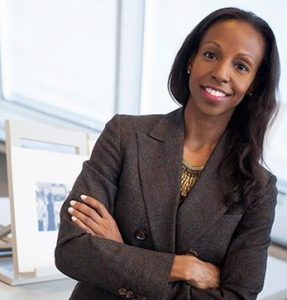HARVARD: We find you in the Arthur M. Sackler building, home to the History of Art and Architecture Department. Today it’s the site of your office, but you had your first class as an undergraduate here. Does this feel like a coming full circle?
LEWIS: So much has changed, but in some sense it does feel like a return. In fact, as I was designing my first lecture for “Vision & Justice,” I was identifying a work to discuss that seemed overly familiar, personal somehow. I poked around my files and found that I had written one of my response papers on the same work, by [African-American painter] Jacob Lawrence in the Harvard Art Museums, that I was planning to teach from. I read my argument about the work and realized that even at the age of 19, I was thinking about the role of art, vision, and citizenship, topics I’m teaching about nearly 20 years later.
HARVARD: After winning first prize from the NAACP’s Afro-Academic, Cultural, Technological and Scientific Olympics at age 14, you lost the same award two years later. How did you recover, and how do you teach failure to your students now?
LEWIS: I was a kid; I was pretty devastated by it. The fluke of winning the first time made me feel somehow reduced. The first time I won, Rosa Parks was on stage. Cornel West was also on stage being honored. And when I say on stage, I should emphasize that the Olympiads were held at a football stadium. The prize was a computer and cash, which, as a teenager, was incredible.
Then I lost. I realized there were extraordinary insights I could gain from the experience that couldn’t have come any other way. I wrote my entrance essay to Harvard about that idea, and, eventually, my book, “The Rise.” I have built into my course a “gift of failure” policy. For the two midterms, the lower of two scores can be thrown out to encourage risk-taking. I want students to have a safe haven to take healthy risks. You can’t be imaginative without the freedom to fail.
HARVARD: You experienced immense loss right after graduating when, in a span of less than two years, seven friends died in unrelated accidents. Can you talk about that time in your life, and how you came out the other side?
LEWIS: I had a period of compound grief, and it really did bring me to my knees. They were all younger than 23, and I was really brought low by it all.
One was one of my closest friends when I was a student here. We shared a birthday, and she was the person I would call just to talk about anything. She saw where my life was going — toward a career in the arts, which felt like an unpopular decision so I valued her support all the more. She was my biggest champion. I feel her loss all the time.
I went with a friend to Jamaica to get away, and I took a picture on a beach of my hand grasping for the horizon. The photo is askew, which is emblematic of where I was — seven friends dying in a row over the course of a year and a half. I keep it on my nightstand because that moment became a demarcation of a second chapter in my life. Losing so many friends made me want to live in a contributory way. It made me want to become my fullest self to do as much as I can for the common good with as much time as I’m given here.
Source: Harvard University









